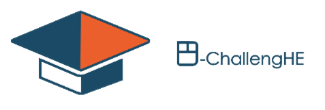

This Guide is developed within the WP5 of the Erasmus+ project ”Digital Challenge in Higher Education” (2022-1-IT02-KA220-HED-000087029).
Chapter 2 The role of teachers’ digital competences
2.3. Institutional development. Organizational communication and professional collaboration
2.3. Institutional development. Organizational communication and professional collaboration
The concept of digital competence in teaching should encompass a comprehensive understanding and proficient execution of all tasks associated with the teaching profession (Tammaro & D’Alessio, 2016; Gómez-Pablos et al., 2022). This broader perspective acknowledges the multifaceted nature of teaching, which integrates pedagogical strategies, critical thinking, and the ability to adapt to various learning environments. Even more, the institutional climate, collaboration within the teaching staff, cooperation with other institutions and professionals proves often to have a major contribution to the overall performance of the educational institution.
The first area of DigCompEdu, Professional engagement, is related to institutional development, as it focuses on educators' use of digital technologies in professional interactions. The DigCompEdu proposal is highly relevant to institutional decision making and to educators alike. As stated in the Spanish adapted version of DigCompEdu, ”The professional engagement of teachers is expressed through the development of the intellectual, physical and psychological development of pupils, their participation in the school, their collaboration with families, and their own professional development. Therefore, digital competence in teaching should not only refer to the ability to use digital technologies to enhance teaching and learning, but it should also refer to the proper performance of all tasks related to professional practice.” (Spanish Framework for the Digital Competence of Teachers, 2022, p. 23).
The European Commission, through the Joint Research Centre, included four competences in the first area of DigCompEdu, Professional development: organisational communication, professional collaboration, reflective practice, digital CPD.
1.1 Organisational communication. To use digital technologies to enhance organisational communication with learners, parents and third parties. To contribute to collaboratively developing and improving organisational communication strategies.
Effective digital communication within educational institutions streamlines processes, improves information flow, and enhances overall efficiency. When educators are proficient in digital communication tools, it leads to better coordination, faster decision-making, and more transparent institutional practices.
Examples of activities (from DigCompEdu):
1.2 Professional collaboration. To use digital technologies to engage in collaboration with other educators, sharing and exchanging knowledge and experiences and collaboratively innovating pedagogic practices.
Digital tools enable educators to collaborate beyond physical and temporal boundaries, sharing knowledge and best practices. Enhanced collaboration fosters innovation, cross-pollination of ideas, and the development of a learning community within the institution.
Examples of activities (from DigCompEdu):
1.3. Reflective practice. To individually and collectively reflect on, critically assess and actively develop one’s own digital pedagogical practice and that of one’s educational community.
Digital tools provide new ways for educators to reflect on and evaluate their teaching methods and professional growth. A culture of reflection leads to continuous improvement, adaptability, and responsiveness to changing educational needs.
Examples of activities (from DigCompEdu):
1.4. Digital Continuous Professional Development (CPD). To use digital sources and resources for continuous professional development.
Digital CPD allows educators to stay current with educational trends, technologies, and pedagogical approaches. When educators continuously upskill, the institution as a whole becomes more competent, innovative, and capable of meeting evolving educational challenges.
Examples of activities (from DigCompEdu):
Overall, these competences contribute to institutional development by:
By focusing on these areas, educational institutions can leverage digital technologies to create more effective, collaborative, and forward-thinking learning environments.
» Provide feedback for this chapter: https://forms.gle/tNyWC1HYMsP46t6WA
« Get back to main page: digital-pedagogy.eu/Guidelines
An open access guide. A perfectible product, for an evolving reality.
You can use the form available on this page to provide feedback and/ or suggestions.
For social annotations on any chapter, you can use Hypothesis or any other similar tool.
You can also send direct feedback to: olimpius.istrate@iEdu.ro | +40 722 458 000
Guidelines for online and blended learning
Available online: https://digital-pedagogy.eu/Guidelines
Full pdf version to download: Guidelines (version 6)
The Romanian partner in D-ChallengHE project in charge with WP5 is
the Institute for Education (Bucharest): https://iEdu.ro
Contact: office@iEdu.ro